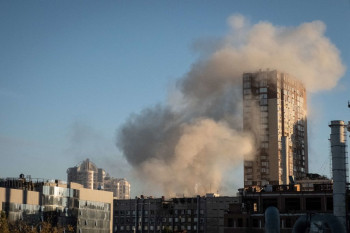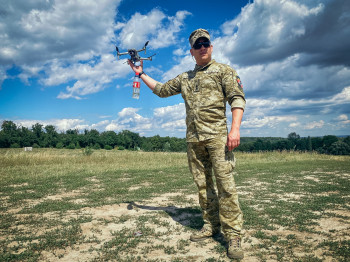Latvian Atlas Dynamics supplies Ukrainian military with futuristic drones, plans to start production in Ukraine
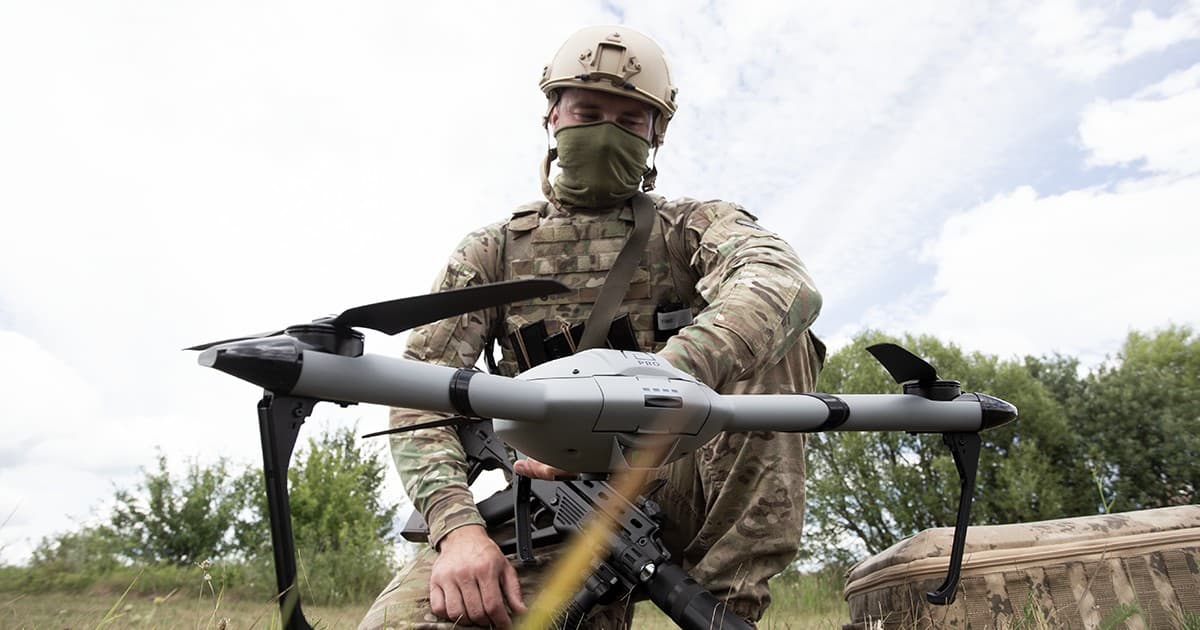
Editor's note: Ivan Tolchinsky visited Ukraine in October to speak at the IT Arena, Ukraine's major technology conference held at the Lviv National Opera on Sept. 30-Oct. 2. Despite the war, the event featured speakers from around the world, including Tolchinsky, US cybersecurity journalist Kim Zetter, Draganfly CEO Cameron Chell, and Baykar's CEO Haluk Bayraktar, who joined the conference online.
The Kyiv Independent was the official media partner of the event.
Ukraine-born Ivan Tolchinsky, 36, has two passions – the army and aviation. To put them together, he founded the drone company Atlas Dynamics, which manufactures unmanned aerial vehicles for military use.
And Ukraine's Armed Forces are now among the top consumers.
As of October, Latvian-based Atlas Dynamics has delivered over 200 small reconnaissance drones to Ukraine. Soldiers use them to recon Russian positions and provide targeting for missiles.
Contrary to large fixed-wing UAVs like Ukrainian Leleka-100 and Furia, Latvian Atlas Pro drones are smaller, lighter, cheaper, and easier to operate.
Yet, they also have drawbacks: one drone can fly only 7-8 kilometers and stay in the air for up to 30 minutes.
Turkish Baykar's small reconnaissance drones, for example, can fly 10 kilometers and stay in the air for 60 minutes. The company's large TB2 drones can fly up to 300 kilometers.
If the Atlas drone breaks, it cannot be repaired on the spot – it must be brought back to Latvia, where all the necessary spare parts are available.
To solve this problem and make the delivery of drones to the battlefield faster and easier, Tolchinsky is thinking about opening a production facility in Ukraine – first to assemble drone parts and then to develop new products.
He is not the only drone manufacturer interested in it: Turkish company Baykar said in September it would set up a factory in Ukraine to produce its famous Bayraktar drones.
Ukraine has a big pool of engineers (prewar number: 285,000 specialists) and an ideal location for delivering drones across Europe, according to Tolchinsky.
The demand for drones will only grow over time, according to Tolchinsky. In Ukraine, the demand is already massive.
"The future of war is a battle between drones — not soldiers," he said. "Drones will use artificial intelligence to make decisions whether to attack or not, saving human lives and costs."
Star Trek-like drones
Tolchinsky is a big fan of Star Trek, an American science fiction series, so he wanted his drones to emulate the design of Star Trek's Starship Enterprise. The Atlas Pro drone's futuristic design even won a prestigious Red Dot Award in 2018.
"The Atlas drone is easy to use and carry around – I can put it in a backpack," said Ukrainian military drone operator Yaroslav, who refused to give his full name for security reasons.
To control the drone, Yaroslav uses a tablet, where he can create missions and set routes. "I learned the basics of how to use it in a few hours," Yaroslav told the Kyiv Independent.
Atlas Pro is a tricopter weighing less than two kilograms that can fly at a speed of up to 56 km/h.
The Atlas drone can be operated by one person, who only needs to spend a few minutes preparing the drone for launch. This distinguishes small reconnaissance drones like Atlas Pro from large fixed-wing drones that can only be operated by several trained specialists, and hence are more expensive to run.
The possibility of jamming Atlas drones is "very low," according to Tolchinsky. "We know exactly which electronic warfare systems Russia uses to intercept drone signals, so we made our vehicles more robust to their influence," he said.
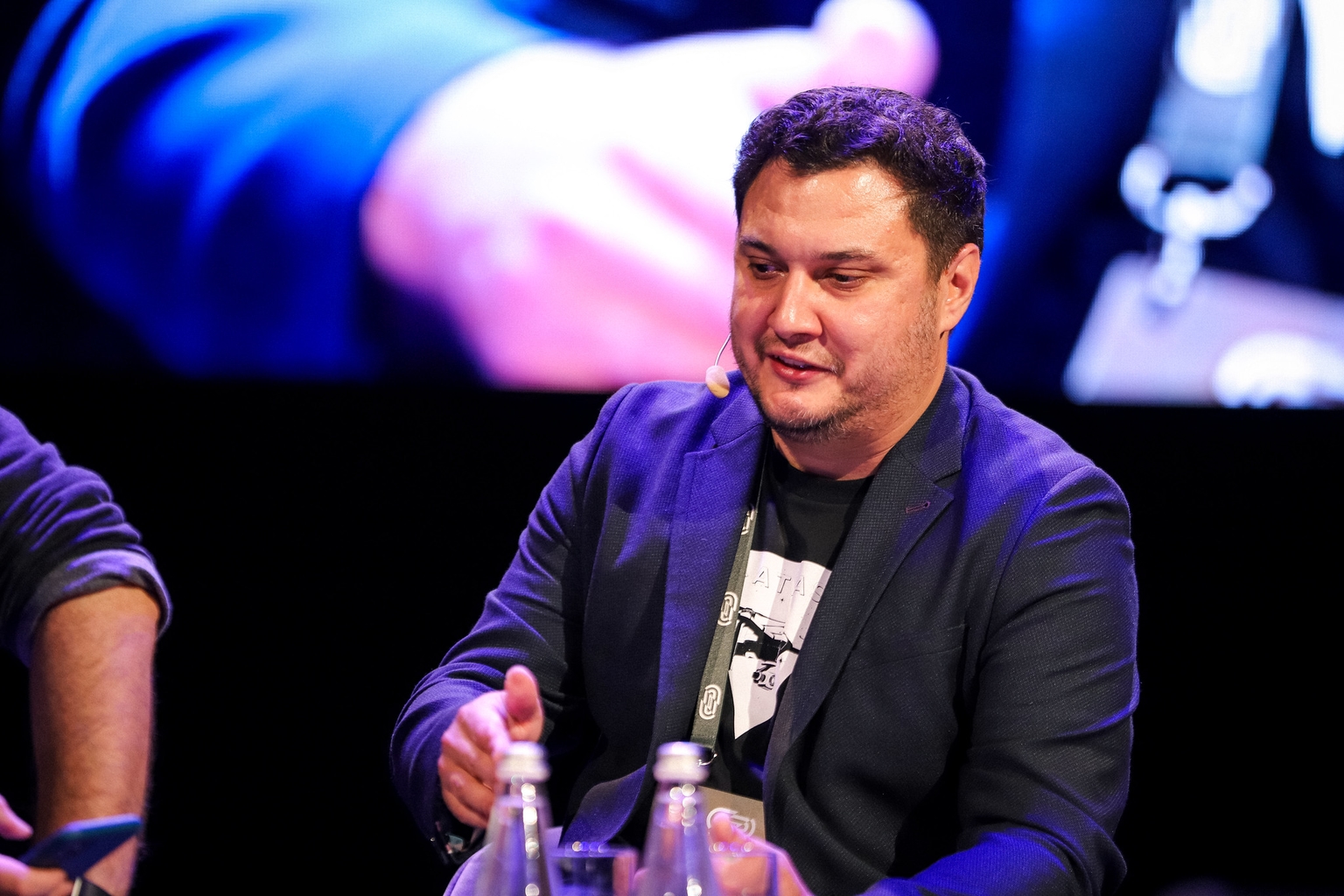
Ivan Tolchinsky speaks at the IT Arena conference in Lviv on Oct. 2, 2022. (IT Arena)
To make the drones more personalized, Atlas gives them names instead of serial numbers. According to him, for fun, some soldiers ask to name the drones after their wives or girlfriends, so some UAVs are called Maria or Anna.
In the world of drones, Tolchinsky wants Atlas to be Tesla or iPhone – stylish, minimalistic, and easy to use. "We make our software look like it's for the average consumer, not for the military professional," he said.
Before launch, the Atlas system is tested by people who have never piloted a drone. "Everyone should be able to use it," Tolchinsky said.
Atlas is fully integrated with the NATO system and meets all of NATO's requirements, including encrypted communication. "We need to encrypt the drone's communications so that no one can seize control of the drone or access its data if the drone crashes in enemy territory," Tolchinsky said.
Before ordering the drones, Ukraine also demanded that Atlas prove that the company produced its software in-house to make sure sensitive data won't leak to Russia.
Earlier in March, German drone retailer MediaMarkt claimed that Chinese drone maker DJI leaked data on Ukrainian military positions to Russia. DJI has dismissed those accusations.
To bring Atlas drones to the battlefield in Ukraine, the company also needs a certificate from the Latvian Ministry of Defense. "Given that Latvia supports Ukraine, we could get it quickly – in a day, not in 2-3 weeks."
Atlas supplies the Ukrainian army with kits that cost about 50,000 euros. One kit includes three drones, three different cameras, bags, batteries, and chargers. The Latvian government or volunteers cover all expenses.
Drones with Ukrainian roots
Atlas Dynamics has a 5,000-square-meter factory in Riga, Latvia. The company employs 77 people, including 24 Ukrainian refugees, who fled the country after the all-out invasion. They assemble motors, fold the plates, and mount the parts of the video camera.
For Tolchinsky, Ukraine is not just a market, it's his homeland. He was born in Horlivka, a city in Donetsk Oblast, occupied by Russia since 2014.
When Tolchinsky was 10 years old, his family moved to Israel. Since then, the army has become part of his life: Tolchinsky participated in the armed conflict in Lebanon and served in the ranks of the special forces of the Israeli army. He later studied Dynamics engineering in Israel and received a private aircraft pilot license.
Israel is known for its advanced technology sector and military innovation, but starting a company in the country is not easy – mass production in Israel is not cost-effective and the regulations are very strict, especially for businesses that could potentially serve the military, according to Tolchinsky.
Latvia, in turn, has affordable taxation and simpler regulation, he said. Companies can hire people there for lower wages than in the U.S. or Western Europe.
Before establishing Atlas Dynamics in 2015, Tolchinsky spent a year in China to learn how to launch hardware mass production effectively.
After launch, Atlas produced only consumer drones for civilian use, but later it entered the industrial and defense markets – they are bigger and more profitable.
Atlas has customers across the world – in Belgium, Luxemburg, the U.K., Latvia, the Czech Republic, Turkey, and South Korea. Its drones are used by rescue workers in Norway, the military in Poland and the Netherlands, as well as by businesses in Japan and Singapore.
Now the company directed all its efforts to help Ukraine. "I used to be happy if I could sell 10 drones a month. Today we are trying to bring the number of UAVs produced per month to 700 units – and this is still not enough," Tolchinsky said in an interview with Deutsche Welle.
Apart from Atlas, dozens of other international and Ukrainian companies supply combat and reconnaissance drones for the Ukrainian army. The Ukrainian government is urging foreigners to donate money to buy military drones.
Actor Mark Hamill, who played Luke Skywalker in the original Star Wars trilogy, has already helped to fundraise money for 500 drones for Ukraine.
Over the past three months, Ukraine's "Army of Drones," a project led by the Ukrainian Ministry of Digital Transformation, signed contracts for $51 million to buy 1,000 drones.
Despite all efforts, the Ukrainian army still needs more drones to fight Russia, according to Tolchinsky. "Ideally, each military brigade should have its own drone," he said.
read also
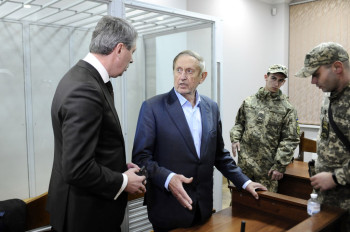
Note from the author:
Hi, this is Daryna Antoniuk, I hope you enjoyed reading my story.
I cover tech for the Kyiv Independent during one of the most difficult times for my country. We need stories like these because the fight on the digital front is just as important as the fight on the ground. And it's with your help that we keep the world informed.
Consider becoming a patron of the Kyiv Independent so you can read more stories about tech and business.

